
Federal Whistleblower Protections
Federal laws apply nationwide and cover employees in various industries, including government, finance, healthcare, and corporate sectors. Some key federal whistleblower protections include:
- False Claims Act (FCA): Allows whistleblowers to report fraudulent claims against the government and receive a portion of recovered funds.
- Dodd-Frank Act: Protects individuals who report financial misconduct to the SEC and CFTC and offers monetary incentives.
- Sarbanes-Oxley Act (SOX): Safeguards employees of publicly traded companies who report securities fraud.
- OSHA and Whistleblower Protections: Covers workers in transportation, environmental safety, and consumer protection industries.
- IRS and SEC Whistleblower Programs: Provide rewards for reporting tax fraud and securities violations.
Federal whistleblower cases often involve government agencies and may allow claimants to remain anonymous. Additionally, federal laws generally supersede state laws if there is a conflict.
State Whistleblower Protections in Virginia and Beyond
State whistleblower laws vary widely in terms of coverage, legal processes, and financial rewards. Virginia has historically provided limited protections compared to some other states but recently strengthened its whistleblower laws. Some key aspects include:
- Virginia Whistleblower Protection Act: Passed in 2020, this law prohibits employers from retaliating against employees who report legal violations, fraud, or health and safety concerns. However, it does not provide a financial reward for whistleblowers.
- Qui Tam Claims Under State False Claims Acts: Some states, including Virginia, have their own versions of the False Claims Act, allowing individuals to report fraud against state governments. These laws often mirror the federal FCA but may have different procedural requirements.
- Private vs. Public Sector Protections: Some states extend whistleblower protections to both private and public employees, while others focus primarily on government workers. Virginia’s laws, for example, offer broader protection for government employees but limited recourse for private-sector whistleblowers.
- Stronger Protections in Other States: States like California and New York have robust whistleblower statutes with financial incentives, stronger anti-retaliation measures, and broader protections than Virginia law.
Because whistleblower protections vary by state, individuals reporting fraud at the state level should consult an attorney to determine which laws apply and whether federal statutes offer stronger protections.
Which Law Applies to Your Case?
Determining whether to pursue a claim under federal or state law depends on the nature of the fraud, your employment sector, and jurisdictional specifics. In many cases, whistleblowers may be eligible for protection under both federal and state laws. Consulting an experienced attorney like Mr. Shoemaker can help you navigate the complexities of whistleblower claims and maximize your legal protection.
Speak With a Whistleblower Attorney
Legal guidance is essential if you suspect fraud and are considering blowing the whistle. Attorney Shoemaker is an experienced whistleblower lawyer who understands the intricacies and protections of various federal and state laws. To schedule a consultation in Newport News, Virginia, please contact us at 757-223-4560.
